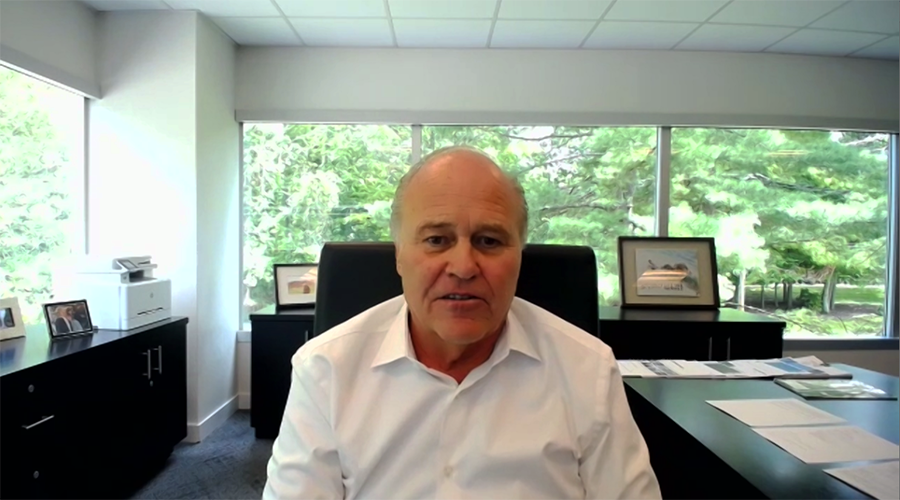
Business guru Tom Peters has written a total of 18 business books selling in the aggregate more than 10,000,000 copies. But just one of those books is itself responsible for about half that total – or 5,000,000 copies. That book, In Search of Excellence, was published in 1982 in collaboration with Robert H. Waterman, Jr. and is to this day considered one of, if not the, most successful business books of all time.
I should note that neither Crestron, nor Randy Klein is featured in the book. But many of the 43 public companies that are profiled in that book as organizations that embraced processes that drive excellence would, in just a few short years after publication, fall into hard times themselves. Companies like Wang Labs, Xerox, and NCR in subsequent years were no longer excellent – and so it would seem that, as the old saying goes, “success is fleeting.”
Yet Crestron under CEO Randy Klein is on a 30-year winning streak. See how…
Yes, Crestron is on a 30-plus-year streak of success, due in no small part to the actions and strategies of its enigmatic President and CEO Randy Klein. I sat down with Klein (via Zoom) to talk about his legacy and how he and Crestron have managed to stay ahead of the pack on such a long-running winning streak.
Like many aggressive, passionate CEOs of multi-billion dollar enterprises, Klein has earned a reputation as a hard-charging, take-no-prisoners market combatant. I have on multiple occasions heard certain industry players describe him using colorful, not-for-polite audiences’ street terms.
Yet on a recent weekday afternoon, I found him engaging, interesting, and thoughtful. Despite his hard-charging reputation, in our conversation, he was both relaxed and reflective.
New Revelations from a Market Leader
Of course, one element likely driving his more wistful mood is his recent announcement that, after 31-years at the helm of Crestron, he would be retiring. For someone reputed to be so hands-on at the helm of the large ocean liner known as the good ship Crestron, it was hard to believe he was ready to turn the helm over to a new captain.
And while Klein may have been relaxed and reflective, he was still sharp as a tack as I sought to drill down on questions of just what drove his success at Crestron and Crestron’s success in the market. He rarely paused more than a second or two, even though I often posed some big questions. And, to my mind, he revealed some elements not heretofore revealed in any other interview.
How Randy Klein Came to Crestron
Klein was born and raised in Utah and started his career in our industry with his first real job as a sales representative selling audiovisual products throughout the rugged region of Utah, Idaho, Wyoming, and Montana. He was offered a sales management job at AVL, which moved him to New Jersey.
From there he went on to become Vice President of Sales and Marketing for a division of General Electric which was a big job with a big title where he made a lot of money – but he didn’t like the business. It was then he heard of an opening at Crestron and he went to meet with company founder George Feldstein.
Klein seemed to relish telling me the story: “And like the guy I am, I came in with a big business plan all written up and it basically said, you’re the engineer and I’m the salesman – so you make products and I’ll take care of the rest of the company.”
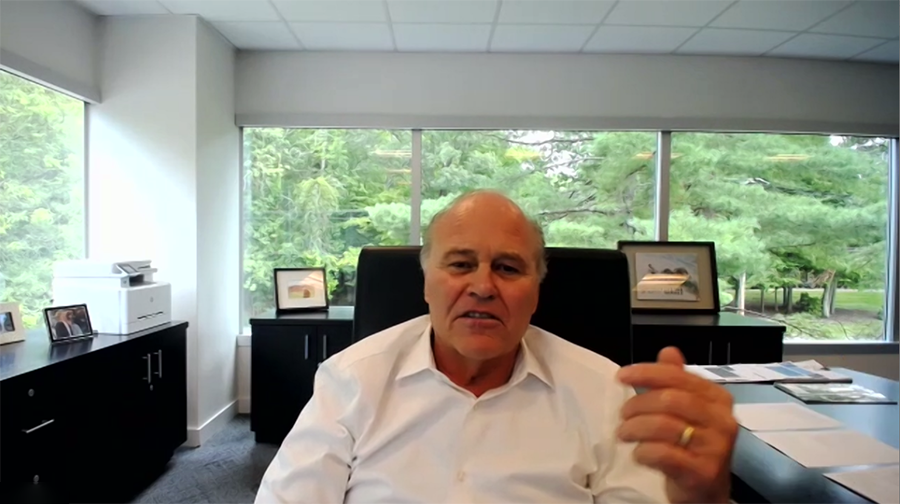
About a month later, Feldstein called Klein and offered him a job as the company’s sales manager. “And to his credit, from that day on to the day he died, he would introduce me and say, ‘This is Randy, he really runs the company.'” It was really George’s company, but that’s how he would introduce me.
The Blueprint That ‘Brings Us to Today’; Step 1 – Add Customer Support
Klein says that the business plan he wrote up 30+ years ago is precisely the plan he pursued. There were three fundamental elements to it: Establish customer support, expand U.S. locations, and expand internationally.
When he first joined the company, Klein immediately saw a company that was gear-focused, but not nearly enough customer and market-focused. So step one in his plan was to establish a customer support department that could help their customers with both pre-sale and post-sale support.
“So my business plan first said all we did is make products. We didn’t do anything else,” Klein told me. “We have to establish a customer support department… And that became the foundation of our company’s True Blue Support.”
Step 2 – Expand Operations Around the U.S.
At the time he joined, Crestron only had facilities in New Jersey – nowhere else in the U.S. So Klein’s plan prioritized expansion, adding facilities in California and Texas. These facilities had salespeople and customer support staff – again getting closer to their customers not just geographically…but by also partnering with them in their system design and building.
“It was clear that we needed to have a presence and we needed to be close to our customer,” Klein emphasized.
Step 3 – Going Global
But…building up the U.S. operations was just the beginning. Klein likes to think big and he had designs on international expansion as well. So the third key to his business plan was to build a strong export market in other large continents around the world, starting with Europe.
“Then I took my suitcase and I went across the ocean to Europe and I started our European operations with a guy that was in charge of Europe at my prior company. And then I packed my suitcases with live demo gear and I went to Asia and I travel around Asia fighting for dealers until I found the right partners for Crestron Asia.
As these initiatives gained traction, the company saw its business explode.
“That is the blueprint that brings us to today.”
People are always asking me, ‘Where is Crestron going to be in 5 years.’ I’ll tell you where Crestron’s going to be in 5 years – bigger and better.”
Randy Klein, CEO of Crestron Electronics
The Incredible Importance of the Customer
It is, the Crestron CEO impressed upon me, all about the customer. He grew more animated as he drove home this point.
“One thing we didn’t have back then is a thing called a customer, and there’s nothing more valuable than a customer. So you need to find customers, and you need to keep customers, and then you need to form that bond between the two of you. And it needs to be a strong bond, so both of you can go to our ultimate customer – the end-user – and deliver a great customer experience,” Klein said emphatically.
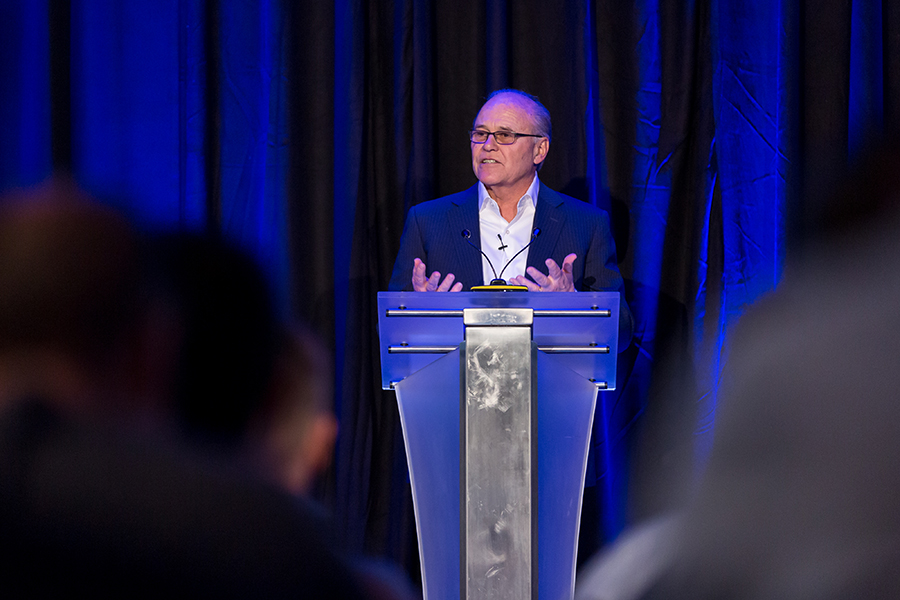
An Epiphany – Differentiating Crestron via Product Category Expansion
The CEO began speaking faster as he warmed up, clearly relishing the conversation. Klein said that he realized one day as he entered an installation and saw that there was both a Crestron panel and a Lutron panel – that this was not good. Intuitively – in sort of an epiphany – he knew that in order for the customer to have a better user experience, there needed to be only one control panel for the entire system.
“There has to be one panel to do everything. We have to own. or be partners in ownership, of all of the technology in all of the rooms or all of the entire house, or the building…any place.”
He admitted that at times, they would be criticized for entering certain categories. But much like Hewlitt Packard, who made both computers and printers, to Klein this was a logical extension of their control solutions and would offer the end-user a superior experience.
“So that has been our strategy for so many years and that’s what’s differentiated us – and that’s what’s provided the pathway to growth,” Klein said.
Staying Ahead of the Curve of Technological Changes
Technology is always changing and is challenging for anyone to stay ahead of the curve. How does Crestron do it? Klein says the key is that the whole company is deeply committed to technology, more than just about any other company, in his estimation.
“Everybody talks about it. but we actually do it. We spend significant multiples more on r&d per revenue dollar than anybody else. And I don’t just mean more than our competitors, I mean, more than even the biggest companies.”
Beyond that, Klein offered the following ways the company stays ahead of the curve.
- They don’t hire outside firms to develop their products, Crestron develops them all in-house
- They don’t copy products, they differentiate them or, as he likes to put it, they “Crestronise” them with added technology, features, or capabilities
- George Feldstein’s slogan for Crestron was “Always the innovator”; and Klein adds that this innovation is not just in their products, but “in every aspect of the company”
- The company has a huge amount of “tribal knowledge” in-house with people who have worked at the company for decades. Other companies change CEOs and management philosophies every couple of years
- They listen to their customers, and ask them to participate…literally bringing in dealers during the early design phase of Crestron Home, for example
This last year, during a pandemic, we produced a quarter of a billion dollars of revenue on new products, alone. We made more money on new products in the middle of a pandemic than at any other time in the company’s history.”
Randy Klein, Commenting proudly on company results in 2020 during the pandemic
What Klein is Most Proud Of
The next question was probably the easiest for Klein to answer – What are you most proud of as you look back over your 31-year career at Crestron?
“Look, when I started at Crestron we had like 100 people and a million dollars or so in revenues,” Klein explained. “I’m obviously proud of being the person at or near the top of this organization responsible for helping the company get to the point where it is today.”
Just exactly where is Crestron today? Crestron’s revenues have grown to an impressive $1.5 billion and the company employs no fewer than 2,000 people. On a revenue/employee basis, they have gone from $10,000/employee to an amazing $750,000/employee. That’s a 7,400% increase!
Klein feels he’s had a good run during his tenure at the company and with numbers like this it would be hard to argue that point.
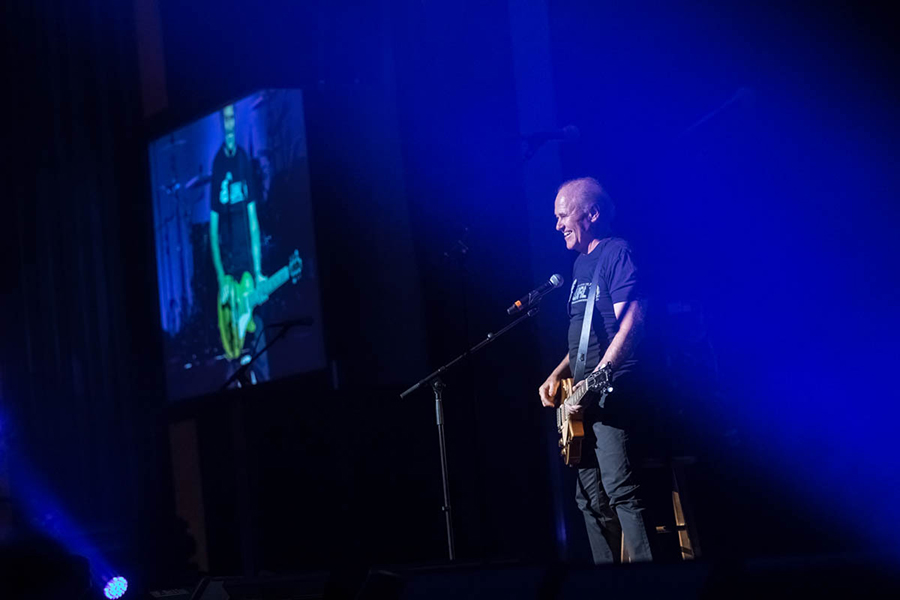
Like a New Age Farm, This Growth was Organic
Even more impressively, this growth all came organically: “I’m more proud of the fact that we did it one customer/one sale at a time – we didn’t do it through one dollar spent on acquisition. And we did it ourselves – we didn’t hire some fancy consultants to come in and tell us what to do. We.grew.this.company.ourselves,” he said. “It is really the true meaning of organic.”
But when I pushed Klein to share with me a more personal take on his multi-decade career, he shared with me that he is proud of how much he’s learned and grown over the years. “I’m a hell of a lot smarter and better today.”
Without missing a beat, though, he goes back to the company. And while the number of buildings and machines and processing centers and warehouses are impressive, what Klein takes a lot of pride in is Crestron people…telling me:
“It just amazes me every day when I sit in on calls or join video meetings, the stuff that Crestron employees do is just absolutely phenomenal.”
Any Regrets?
This next question is probably my favorite interaction with Klein. The way he answered the question demonstrated a characteristic I noticed throughout the entire interview. He is sharp, he is quick-witted..and he can clearly think on his feet. But, he is also thoughtful and reflective – and you can see that when he often extends his answers with a much more thoughtful and nuanced response to a big question. Sort of like a boxer delivering a quick jab to the jaw to stun you, and then takes extra time to wind up a big roundhouse blow that’ll knock you out.
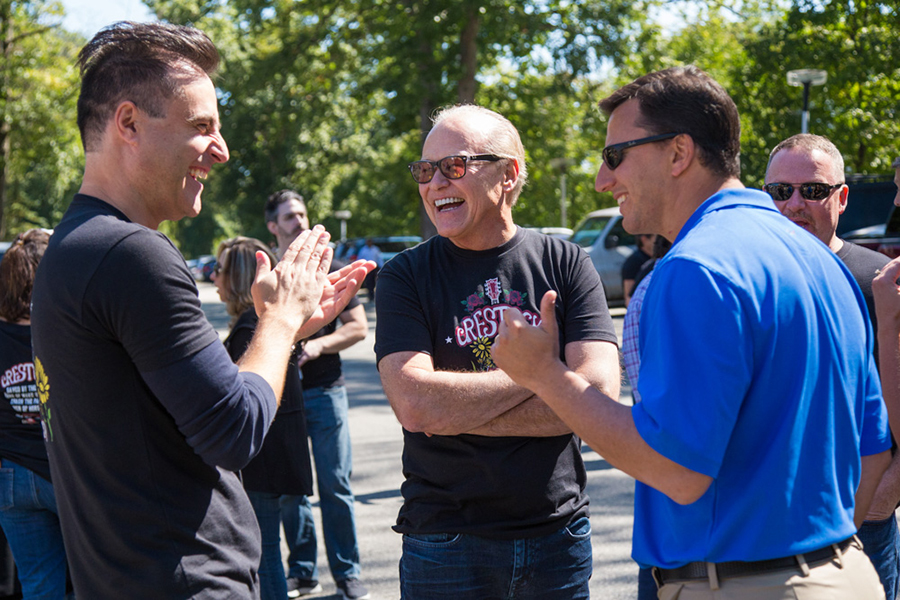
The question was: As you think about your 30-year career at Crestron, do you ever look back and say to yourself, “I probably should have done this differently, or maybe I should have gone a different direction there?”
Klein quickly quipped: “What do I regret? You know, I don’t think I’d change a thing and I certainly don’t have any regrets at all. I really don’t.”
But then, a short beat later, he offered a more nuanced question of himself that was actually a little closer to my original question:
“But truthfully, if I could have a ‘do-over’, what would I change? You know, I wish I could have spent more time because I’m a very fast-moving person. I wish I could have spent more time on some of the more important things that, looking back now, I know I would have been able to make an even bigger difference. But you know I am a pretty fast-paced person and I just plowed through stuff.
“And you know I think that’s what happens as you get older – you get a little more thoughtful. And I find myself sometimes thinking, geez, I wish I would have spent more time with that person…I wish I would have handled this situation a little bit differently, knowing what I know now.”
Learn more about Crestron and its extensive line of products by visiting: crestron.com.








Leave a Reply